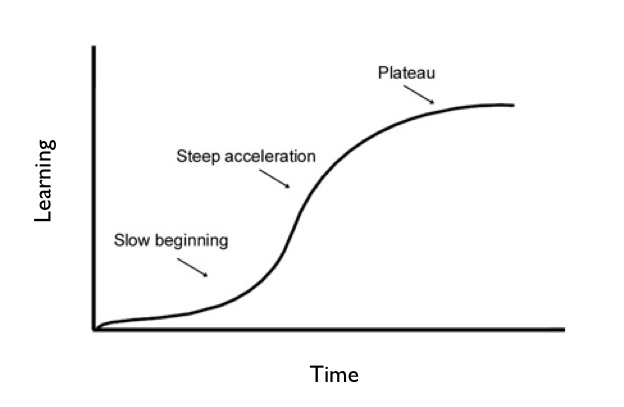LauraDring
Practice NEVER Makes Perfect
You can always practice more!
Aim : To explain the power law of learning is and to help explain how learning and doing are related.
General Argument: The learning curve suggests that as we continue to pratice our learning slows down and plateau's eventually, the power law of learning suggests that we are constantly learning no matter how long we have been practicing (e.g cigar rolling women workers). Manual, perceptual and memory tasks have shown these patterns of doing always showing constant learning. How can this relate to learning in an educational setting?
Personal Conclusion: Learning and doing are closely linked. The pathway between doing and learning is clearer with manual simple tasks rather than more complex univeristy topics (which is mainly what we are interested in, personally!). Never can you pratice so much that you stop learning....You will never be perfect!!!
Learning and Doing
Concept that if you are doing then you are learning can be clearly seen in manual learning.
The most famous study on learning and doing was by Crossman (1959) about the industrialisation of cigar making. The speed and precision of female operators was compared to machines would were being considered being introduced. It was found that at first the machines have a quicker cycle time than female operators, but after up to 20 million cigars made by operator’s they continued to show improvement, ultimately over taking the machines in their speed. This was a massive breakthrough in learning, showing that at least for manual learning that practice, practice and more practice makes you faster if not perfect.
These results have been replicated with other tasks, such as perception by Neisser, Novick and Lazar (1963), memory, and even more complex routine tasks has been shown by Moran (1980).
The Learning Curve
Basically, the learning curve suggest that intitally learning occurs very fast and then eventually slows down to a plateau when related to a specific topic. See the image below for a basic outline.

The Power Law of Learning
Key Paper: Newell and Rosenbloom (1981) "Skill Acquistion and The Law of Practice" in Cognitve Skills and Their Acquisition Eds J. R Anderson, New Jersey
- Detailed explaination of how log to log laws relate to learning
- Detailed examples of manual, perception, memory and motor behaviour learning tasks
The Power Law of Learning, is a " log to log linear learning law", which from the papers I can understand to simply be the log plot of the learning curve, it was commonly thought that as practice continued learning would decrease.
Newell and Rosenbloom suggest that this is untrue based on the emprical data below and propose that learning doesn't stop as practice continues but is always occuring and furthermore that this type of learning could apply to all mental cognitive tasks not just perceptual or motor skills.
The Chunking Theory of Learning
Key Paper: Gobet F, Lane P C R, Croker S, Cheng P C-H, Jones G, Oliver I, and Pine J M (2001) "Chunking mechanisms involved in human learning" Trends in Cognitive Sciences, 5 (6)
- Good Review of the historical and recent researching within the area
- Goal and Perceptual orientated chunking
- Reviews models such as EPAM and CHREST (both used in expert chess learning tasks) examples which have been used in chess games
Suggestion by Newell and Rosenbloom (1981) that chunking can be linked in learning and that both goal oriented and perceptual chunking can help with learning.Chunking is waht we all know about from Miller (1956) (The Classic 7 (+/-) theory we are all familar with). Chunking is the reason that learning can continue past the normal plataeu period.
Further questions that I think should be answered:
- Does repetitive "doing" such as re-writing multiple essays help with unknown essay questions? (Specific to Psychology exams)
- How can automative perceputal learning be linked to improve goal-directed learning?
So, sorry no matter how much studying (practice) you do you can never be perfect, just close!
References
Crossman (1959) A theory of acqusition of speed-skill, Ergonomics, 2, 153-166
Gobet F, Lane P C R, Croker S, Cheng P C-H, Jones G, Oliver I, and Pine J M (2001) "Chunking mechanisms involved in human learning" Trends in Cognitive Sciences, 5 (6)
Miller (1956) The magic number seven plus or minus two: Some limits on our capacity for processing information, Psychological Review, 63, 81-97
Moran (1980) Compiling cognitive skill, (AIP Memo 150, Xerox PARC)
Neisser, Novick and Lazar (1963) Searching for ten targets simultaneously, Perceptual and motor skills, 17, 955-961
Newell and Rosenbloom (1981) "Skill Acquistion and The Law of Practice" in Cognitve Skills and Their Acquisition Eds J. R Anderson, New Jersey
